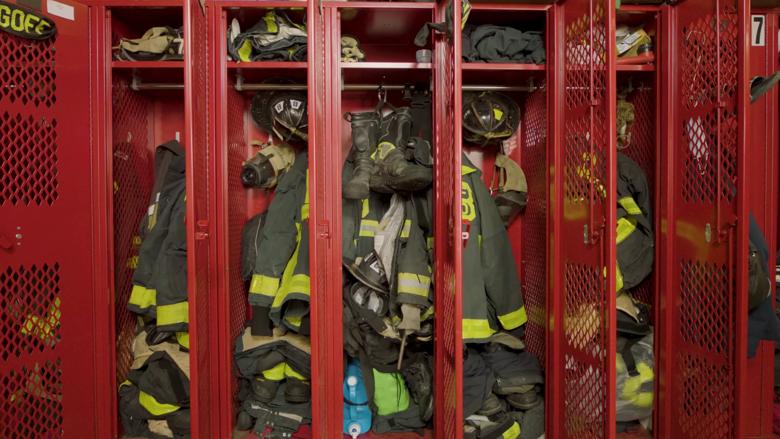Free showing set for April 20 at Cedar Lee Theatre; social event to be held afterward at Boss Dog Brewery

Cancer is the No. 1 cause of death among all firefighters, and new research is pointing to the role that a family of synthetic chemicals known as PFAS, which help make firefighting gear waterproof, plays in causing those cancers.

Image content: This image is available to view online.
View image online (https://assets.clevelandclinic.org/transform/5d840c56-141e-4d19-8491-fe470420dca9/BURNED-J25-1382x2048-1_jpg)
To help spread awareness about the risks from PFAS, which is in all firefighting gear currently sold in the United States, Cleveland Clinic has secured the rights to show a new documentary, “Burned: Protecting the Protectors.”
The special screening ‒ at 7 p.m. Thursday, April 20, at the Cedar Lee Theatre at 2163 Lee Road in Cleveland Heights ‒ is free to area firefighters, chief officers and elected officials who are involved in public safety oversight.
“Cleveland Clinic has a history of committing support to issues that impact our local first responders,” said Thomas Beers, EMS Program Manager for Cleveland Clinic. “This documentary, which tells the true story of how a firefighter’s wife uncovered the link between PFAS and cancer, was created to help people understand the gravity of the problem and advocate for changes.”
After the 30-minute film, officials from the Ohio Association of Professional Fire Fighters will lead a discussion on best practices in mitigating exposures to PFAS until such time that PFAS-free gear is available. A physician from Cleveland Clinic’s Taussig Cancer Institute will be on hand to talk about the types of cancers most commonly seen in firefighters and current treatment options.
Attendees will receive one hour of continuing education credit for this event. Seating is limited and reservations are required. They can be made at www.clevelandclinic.org/burned.

Image content: This image is available to view online.
View image online (https://assets.clevelandclinic.org/transform/fffde24e-b873-4f08-93a4-ef5140ac649b/Still6_png)
There will be a social event immediately afterward at Boss Dog Brewery — located next door to the theater at 2179 Lee Rd., Cleveland Heights — sponsored by Cleveland Clinic, Cleveland Heights Firefighters L402 and Shaker Heights Firefighters L516.
PFAS is a term that refers to a family of synthetic chemicals, often referred to as “Forever Chemicals.” At least 12,000 individual PFAS chemicals have been identified to date. Defined by their strong carbon-fluorine bonds, they are used in many products to repel water and grease. Properly disposing of them is extremely difficult, which is why they are found in most bodies of water today. They are believed to be able to exist in the environment for tens of thousands of years without degrading.
They can accumulate and remain in a person’s body for years due to their long biological half-lives, hence the name “Forever Chemicals.” They can affect the body in many ways, most notably causing cancer, immunotoxicity, endocrine disruption, elevations in cholesterol, liver damage, reproductive harm and developmental risks.
Studies have found that from 2002 to 2019, 66 percent of firefighter deaths in the U.S. were due to cancer. There can be other contributing causes, such as smoke inhalation and diesel exhaust, but PFAS chemicals are now widely believed to play a major role in firefighter deaths.
There are no known suppliers of firefighter gear without PFAS today.
To arrange to cover the event, contact Beth Hertz at 330.590.7377 or hertzb@ccf.org.
Cleveland Clinic is a nonprofit multispecialty academic medical center that integrates clinical and hospital care with research and education. Located in Cleveland, Ohio, it was founded in 1921 by four renowned physicians with a vision of providing outstanding patient care based upon the principles of cooperation, compassion and innovation. Cleveland Clinic has pioneered many medical breakthroughs, including coronary artery bypass surgery and the first face transplant in the United States. Cleveland Clinic is consistently recognized in the U.S. and throughout the world for its expertise and care. Among Cleveland Clinic’s 82,600 employees worldwide are more than 5,786 salaried physicians and researchers, and 20,700 registered nurses and advanced practice providers, representing 140 medical specialties and subspecialties. Cleveland Clinic is a 6,728-bed health system that includes a 173-acre main campus near downtown Cleveland, 23 hospitals, 280 outpatient facilities, including locations in northeast Ohio; Florida; Las Vegas, Nevada; Toronto, Canada; Abu Dhabi, UAE; and London, England. In 2024, there were 15.7 million outpatient encounters, 333,000 hospital admissions and observations, and 320,000 surgeries and procedures throughout Cleveland Clinic’s health system. Patients came for treatment from every state and 112 countries. Visit us at clevelandclinic.org. Follow us at x.com/CleClinicNews. News and resources are available at newsroom.clevelandclinic.org.
Editor’s Note: Cleveland Clinic News Service is available to provide broadcast-quality interviews and B-roll upon request.